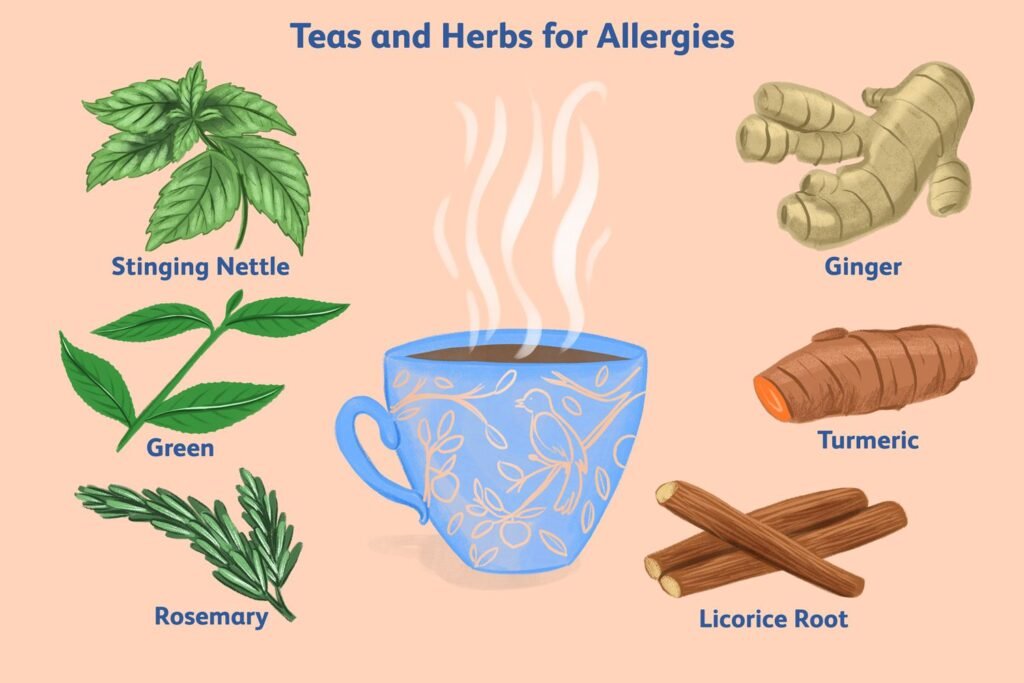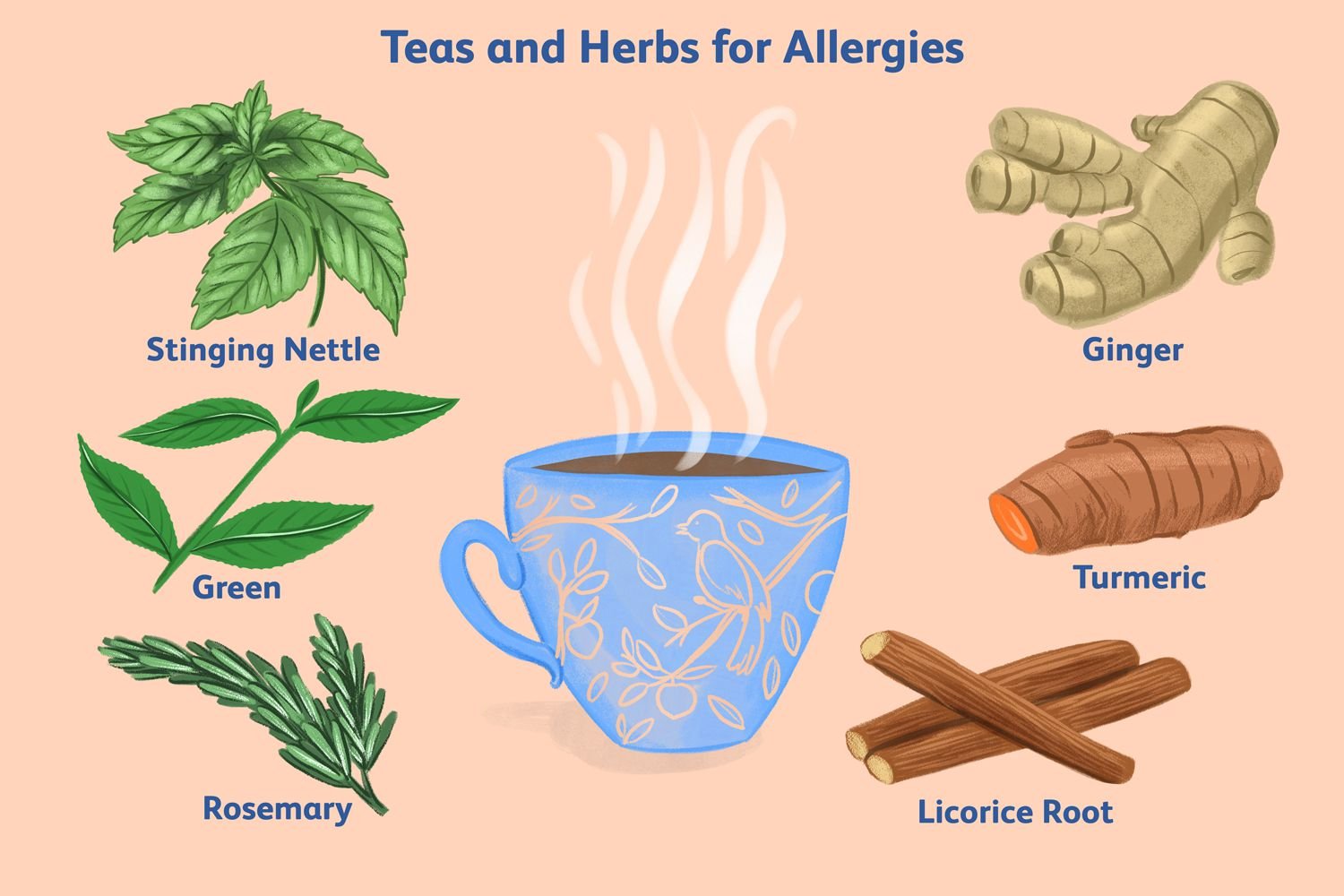
Seasonal allergies, or hay fever, can feel like an annual rite of passage. Whether it’s the budding trees and blooming flowers in spring, or the falling leaves and crisp air of autumn, allergens like pollen and mold make life uncomfortable for many. Luckily, nature offers us an abundance of herbal remedies to ease the symptoms of these allergies, and what better way to enjoy their benefits than in a soothing cup of tea?
As someone who has battled seasonal allergies for years, I’ve found that certain herbal tea blends are not just comforting but can help alleviate symptoms like sneezing, congestion, and itchy eyes. In this article, I’m going to share some of my favorite herbal teas for seasonal allergy relief and explain why they work.
Why Herbal Teas for Allergy Relief?
Herbal teas are a powerful tool in the fight against seasonal allergies. Many herbs contain natural antihistamines, anti-inflammatory properties, and immune-boosting compounds that help reduce the body’s allergic reactions. I’ve learned that combining specific herbs can create a potent blend to target multiple allergy symptoms at once.
These herbal teas also offer other benefits, such as relaxation, hydration, and an overall feeling of wellness — perfect for tackling allergy season without relying on harsh medications.
Top Herbal Tea Blends for Seasonal Allergy Relief
I’ve curated these herbal tea blends based on their individual properties and how they work together to ease allergy symptoms. These herbs can help reduce inflammation, support your immune system, and soothe your respiratory system. Let’s dive in!
1. Peppermint and Nettle Tea
- Why it works: Peppermint is well-known for its cooling and soothing properties, especially for the respiratory system. It contains menthol, which can open up blocked airways and ease congestion. Nettle, on the other hand, is a natural antihistamine and anti-inflammatory, which is ideal for reducing sneezing and itchy eyes that come with allergies.
- How to prepare: Steep 1 tablespoon of dried nettle leaves and 1 tablespoon of dried peppermint leaves in hot water for 5–10 minutes. Strain and sip slowly. You can also add honey or lemon for an extra immune boost.
- Benefits:
- Relieves nasal congestion
- Reduces sneezing and itching
- Helps clear the respiratory passages
2. Chamomile and Elderflower Tea
- Why it works: Chamomile is calming, but it’s also an anti-inflammatory, making it effective for soothing an inflamed respiratory system. Elderflower contains antioxidants and is known to help reduce sinus congestion. Combined, they make a powerful duo to calm the body and clear the sinuses during allergy season.
- How to prepare: Combine 1 teaspoon of dried chamomile flowers with 1 teaspoon of dried elderflower. Pour hot water over the herbs and steep for 5–7 minutes. You can add a bit of lemon juice for added flavor.
- Benefits:
- Reduces sinus inflammation
- Relieves headaches and sinus pressure
- Supports overall immune function
3. Ginger and Turmeric Tea
- Why it works: Both ginger and turmeric are well-known for their anti-inflammatory and immune-boosting properties. Ginger helps to ease congestion and calm irritated airways, while turmeric contains curcumin, a compound that helps to reduce the body’s inflammatory response to allergens.
- How to prepare: Add 1–2 slices of fresh ginger and a pinch of ground turmeric to a cup of hot water. Let it steep for 5–10 minutes. For an extra immune boost, you can add a pinch of black pepper (it helps with turmeric absorption) and honey for sweetness.
- Benefits:
- Eases inflammation and congestion
- Supports the immune system
- Relieves sore throats and coughs
4. Lemon Balm and Lavender Tea
- Why it works: Lemon balm is a member of the mint family and is often used to calm the nervous system, but it also has natural antiviral and anti-inflammatory properties. Lavender, known for its ability to ease stress and anxiety, also has a positive effect on the respiratory system by reducing inflammation in the airways.
- How to prepare: Combine 1 teaspoon of dried lemon balm and 1 teaspoon of dried lavender flowers in a teapot. Pour in hot water and steep for 5 minutes. The calming aroma of lavender will instantly soothe you, while lemon balm helps reduce any allergic reactions.
- Benefits:
- Relieves nasal congestion
- Helps manage stress caused by allergies
- Supports a restful sleep despite allergy discomfort
5. Licorice Root and Marshmallow Root Tea
- Why it works: Licorice root is a powerful herb for soothing the throat and reducing inflammation. It’s also known to act as a mild expectorant, which can help loosen mucus. Marshmallow root, meanwhile, is mucilaginous, meaning it forms a gel-like substance that helps coat and soothe the respiratory tract, reducing irritation and inflammation.
- How to prepare: Add 1 teaspoon of licorice root and 1 teaspoon of marshmallow root to boiling water. Let it steep for 10–15 minutes for maximum benefit. You can also combine this with a little honey to further soothe a sore throat.
- Benefits:
- Soothes sore throats and coughs
- Reduces irritation in the airways
- Acts as a natural expectorant to clear mucus
Other Tips to Maximize Your Allergy Relief
- Stay Hydrated: Drinking herbal tea is an excellent way to stay hydrated, which helps thin mucus and keeps your airways clear.
- Time Your Tea: I’ve found that sipping tea regularly, especially during the morning and evening, can help keep allergy symptoms at bay.
- Add Honey: Local honey is a natural way to build resistance to allergens in your area. A teaspoon of honey in your tea may help reduce allergic reactions over time.
- Avoid Triggers: While herbal tea can help manage symptoms, it’s also important to limit exposure to allergens by staying indoors when pollen levels are high and keeping windows closed.
Why Choose Herbal Teas for Seasonal Allergy Relief?
As someone who prefers natural remedies, I believe herbal teas are an excellent option for managing seasonal allergies. They not only target symptoms like congestion and sneezing, but they also offer a relaxing experience that medication often can’t. With their natural ingredients, these teas are gentle on the body and can be enjoyed regularly, without the fear of side effects.
Whether you’re dealing with the onset of spring allergies or the fall mold season, these herbal blends can offer much-needed relief and bring comfort to your daily routine. And best of all, you can enjoy them year-round as a wellness boost.
If you’re looking for a way to manage your allergies more naturally, consider brewing up one of these herbal tea blends. It’s a simple, soothing, and effective way to take control of your seasonal symptoms and feel your best, no matter the season.
Final Thoughts
If you’re ready to try a natural remedy for your allergies, I encourage you to give these herbal tea blends a try. Over time, you’ll not only experience allergy relief but also enjoy the many other health benefits that come with these herbal powerhouses. Let me know which blend works best for you, and don’t hesitate to share your favorite recipes or modifications in the comments!
Stay calm, breathe easy, and sip away—your seasonal allergies don’t stand a chance against these herbal allies.









